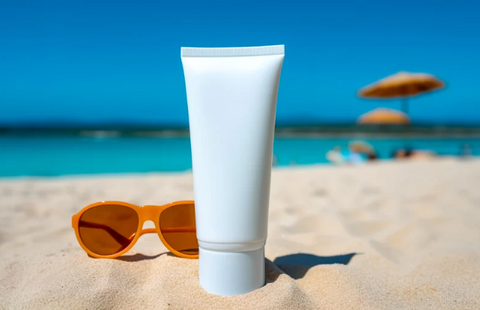With growing interest in sustainable skincare, many are turning to organic sunscreen for effective, eco-friendly sun protection. However, recognizing a true organic formula can be challenging. Organic sunscreens focus on natural ingredients, like non-nano zinc oxide and organic shea butter, offering safer options for sensitive skin, kids, and babies while helping protect the environment. Natural sunscreens, as opposed to chemical varieties, minimize skin reactions and irritation, making them suitable for a wide audience, including vulnerable populations like babies and pregnant women. Here’s a quick guide on identifying the best organic, dermatologist-tested sunscreens for your family.
What is Organic Sunscreen?
Organic sunscreen is crafted from natural and organic ingredients, steering clear of harsh chemicals, synthetic fragrances, and artificial preservatives. These sunscreens rely on natural active ingredients like zinc oxide and titanium dioxide, along with plant extracts, to deliver broad-spectrum protection against both UVA and UVB rays. This makes them gentler on the skin and less likely to cause reactions, making them an excellent choice for those with sensitive skin. By opting for organic sunscreen, you ensure that your sun protection is both effective and kind to your skin.
Check for Certified Organic Ingredients
The most reliable way to ensure a sunscreen is organic is by looking for certified labels. Organic certifications guarantee the absence of harmful chemicals and toxic ingredients, focusing on active ingredients like non-nano zinc oxide, coconut oil (often labeled as Cocos nucifera), and vitamin E. These organic, cruelty-free ingredients cater to all skin types, making the sunscreen reef-safe and safe for the whole family. For sensitive skin, we recommend a specific baby mineral sunscreen lotion as the only sunscreen, emphasizing its non-toxic and reef-friendly ingredients.
Avoid Synthetic and Chemical Zinc Oxide Sunscreens
Conventional chemical sunscreens use synthetic ingredients like oxybenzone and octinoxate, which may irritate very fair skin or sensitive skin and harm marine life. Instead, organic sunscreens use natural ingredients, such as organic shea butter, mineral sunscreens like zinc oxide, and botanicals that are non-comedogenic and designed to avoid clogging pores. Zinc oxide sunscreen, particularly in its non-nano form, reflects harmful UV rays rather than absorbing them, and is free from toxic chemicals, making it a healthy, environmentally friendly alternative. These sunscreens are free from parabens and other chemicals, reducing irritation and breakouts for face sunscreen and body use.
Look for Broad-Spectrum and Water-Resistant Protection
Organic sunscreens that offer broad-spectrum protection defend against both UVA rays and UVB rays, essential for protecting against sunburn and skin cancer. Mineral-based formulas with non-nano zinc provide this protection without penetrating the skin, making them safer for fair skin and babies. Water-resistant and non-greasy, these sunscreens absorb easily without leaving a noticeable white cast.
Ensure Eco-Friendly, Reef-Safe Ingredients
When choosing an organic sunscreen, look for “reef-friendly” labels to ensure it’s safe for the environment. This generally includes sunscreens that avoid chemicals harmful to coral reefs, focusing instead on natural mineral sunscreens like zinc oxide. These sunscreens are ideal for environmentally-conscious users and those with sensitive skin, offering natural protection while reducing harm to marine ecosystems.
Key Features of Quality Organic Mineral Sunscreens
-
Certified organic ingredients without synthetic chemicals or parabens.
-
Active ingredients like non-nano zinc oxide for natural sun defense.
-
Broad-spectrum protection against harmful rays, including UVA and UVB.
-
Non-comedogenic and chemical-free options for sensitive skin and very fair skin.
-
Reef-safe formulas for eco-friendly sun protection.
Tips for Using Organic Sunscreen
-
Apply liberally: For optimal protection, apply organic sunscreen generously to all exposed skin about 15-30 minutes before heading outdoors. This allows the sunscreen to form a protective barrier against harmful rays.
-
Reapply often: To maintain effective sun protection, reapply organic sunscreen every two hours, or immediately after swimming or sweating. This ensures continuous coverage and protection.
-
Choose the right SPF: Select an organic sunscreen with an SPF of at least 30 to ensure adequate protection against UVB rays. Higher SPF levels offer more extended protection, especially for very fair skin.
-
Be mindful of expiration dates: Always check the expiration date on your organic sunscreen and replace it as needed. Expired sunscreen can lose its effectiveness, leaving your skin vulnerable to harmful rays.
-
Combine with other protective measures: Use organic sunscreen in conjunction with other protective measures such as wearing protective clothing, hats, and seeking shade during peak sun hours. This multi-faceted approach enhances your overall sun protection strategy.
Common Misconceptions about Organic Sunscreen
-
Myth: Organic sunscreens are not effective: Reality: Organic sunscreens can provide excellent protection against both UVA and UVB rays, thanks to natural active ingredients like zinc oxide.
-
Myth: Organic sunscreens are only for sensitive skin: Reality: While they are ideal for sensitive skin, organic sunscreens are suitable for all skin types, including very fair skin and fair skin.
-
Myth: Organic sunscreens are expensive: Reality: Although some organic sunscreens may have a higher price point, there are many affordable options available that offer excellent sun protection.
-
Myth: Organic sunscreens are not water-resistant: Reality: Many organic sunscreens are formulated to be water-resistant, making them suitable for use during swimming and other water activities.
Choose Organic for Smooth, Gentle Skincare for Sensitive Skin
Choosing organic means opting for natural, chemical-free protection that suits a variety of skin types—from fair skin to sensitive skin. With organic shea butter, coconut oil, and zinc sunscreens as core ingredients, these products offer a non-greasy, smooth application ideal for makeup layering. Plus, they’re often formulated to be non-comedogenic and water-resistant, perfect for daily wear and outdoor activities.
Invest in Certified Organic Sunscreen for Long-Term Benefits
Whether you’re looking for face sunscreen, body protection, or a product that’s personally tested to fit various skin types, certified organic sunscreens deliver safe, effective sun protection. To learn more about finding quality sunscreens that align with eco-friendly values and comprehensive skin care, please contact us.
